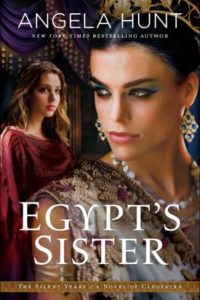For her new historical series The Silent Years, Angela Hunt digs into the “silent” period between the Old Testament and New Testament. Egypt’s Sister: A Novel of Cleopatra (Bethany House) introduces readers to a Jewish woman who befriends Cleopatra. After experiencing the best and worst of Roman society, Chava must choose between love and honor, between her own desires and God’s will for her life. In this Q&A, Angela Hunt explains why she wrote a biblical-era novel about someone who isn’t in the Bible, what attracted her to writing about this era between the Testaments, and the surprising things she learned researching ancient Egypt and Rome…
 Why did you decide to write about Cleopatra, of all people? She’s not exactly a biblical character.
Why did you decide to write about Cleopatra, of all people? She’s not exactly a biblical character.
I chose to write about Cleopatra—and in the first book, no less—because people are familiar with her history. She lived and reigned thirty years before the birth of Christ, so I knew she’d be a good introduction to this period. Plus, she’s fascinating.
Few Christian novelists have written about the inter-testamental period. What drew you to that era?
I would always rather do something new, because I love learning new things myself. I had never read any Christian novels set in this period, and I knew very little about the time, so I knew it’d be a challenge. I love challenges.
What, if anything, did you learn about Egypt and Rome that surprised you?
I learned lots of surprising things. First, I learned that Cleopatra and her royal forebears weren’t Egyptian—they were Macedonian Greeks, descended from Alexander the Great. They lived in Alexandria and spoke, dressed, and behaved according to Greek traditions and customs, not Egyptian. Second, I was surprised by the many similarities between our government and the Roman system.
Chava, your heroine, hears the voice of God speaking to her in her youth. Did you write from experience? Has something similar ever happened to you?
Yes. Though I did not hear God speak audibly, I felt Him speak to me as a teenager, and He gave me a promise that was fulfilled, even though at the time everything seemed against that possibility. So when the same thing happened to Chava, I was writing from experience.
What parallels do you see between the ancient Romans and contemporary American society?
The more secular the United States becomes, the more like the Romans we become. The chief difference between our two systems is that America was founded by Christian people who sought religious freedom. The Romans celebrated religious freedom, too, but they were pagans, with a god for everything. Our system of morality is based upon Judeo-Christian principles, but the Romans had no such foundation. The more we abandon our foundational principles, the more like the Romans we become.
What’s up next for The Silent Years series?
The next book in the series, Judah’s Wife, goes back to the time of the Maccabees when Judea and the Jews were living under the heavy hand of the Seleucids and all the world had gone over to Greek thinking, speaking, and living. Just as many Christians find it challenging to live in an increasingly secular world, so the Jews found it difficult to live as religious Jews under the heavy Hellenistic influence.


